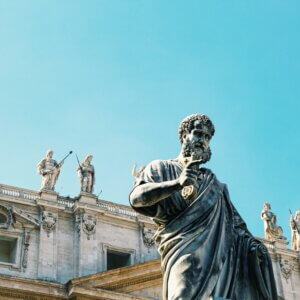I mentioned in my inaugural blog post that these Monday Morning Musings may at times include things that I wish I had said in the previous Lord’s day but was for some reason or another prevented from doing so.
Today is one of those days.
**Later Edit**
I was also prevented from posting on Monday due to a change in my schedule which enabled my wife and I to attend a showing of the recently released film, “The Sound of Freedom,” on Monday morning. I will take this opportunity to encourage everyone to go and see this film. The subject matter about child trafficking is very weighty but the treatment of the content of the film was done very well. My friend, Jon Herrera, recently said it this way, “they were able to make a film about the exploitation of children, without exploiting children.” This is difficult to do and it seems here it has been done. This does not mean that those who have experienced abusive trauma as children themselves will be able to endure the content without being triggered, so please take that into consideration, but everyone who feels able, ought to see this movie if at all possible. If finances would keep you from seeing it in the theater, you can follow this link to receive a free ticket to see the film:
https://www.angel.com/blog/sound-of-freedom/posts/how-to-redeem-free-tickets-to-sound-of-freedom
You can also “pay it forward” for others to watch the film for free by following this link:
https://www.angel.com/pay-it-forward/sound-of-freedom
Or better yet, take someone to see the film.
****
Okay back to the blog
****
My text for this last Lord’s day was Psalm 119:49-64.
We only really made it to verse 57, and that was even with some jumping around. Due to the schedule for the summer I plan to just carry on with the next two stanzas the following week.
I do, however, want to spend some time today reflecting on one portion of the stanza titled “HETH” in Psalm 119.
Psalm 119:58
[58] I entreat your favor with all my heart;
be gracious to me according to your promise.
The King James renders it thusly (😉): “I intreated thy favour with my whole heart: be merciful unto me according to thy word.”
“…be merciful unto me.”
I’ve heard these words before.
Have you?
Luke 18:9-14
[9] He also told this parable to some who trusted in themselves that they were righteous, and treated others with contempt: [10] “Two men went up into the temple to pray, one a Pharisee and the other a tax collector. [11] The Pharisee, standing by himself, prayed thus: ‘God, I thank you that I am not like other men, extortioners, unjust, adulterers, or even like this tax collector. [12] I fast twice a week; I give tithes of all that I get.’ [13] But the tax collector, standing far off, would not even lift up his eyes to heaven, but beat his breast, saying, ‘God, be merciful to me, a sinner!’ [14] I tell you, this man went down to his house justified, rather than the other. For everyone who exalts himself will be humbled, but the one who humbles himself will be exalted.”
Here, we see this parable told, by Jesus, to those that trusted in themselves that they were righteous, and treated others with contempt. In other words they were looking to themselves for justification by their own works, and then were proud enough of their own performance to then look down on others, which shows just how self deceived they were that they could not see the pride in their own hearts as the moral depravation that it was. They walked around with their own little spotlights shining on themselves, (they were like our modern TikTok stars with their little selfie ring lights), thinking much higher of themselves than they should and far less of others than they ought. In the middle of their self centered show, Jesus shines the blinding light of the glory of God on the least likely candidate, the tax collector.
Tax collectors have never been liked. Least of all in Jesus’ day. They were considered to be the worst kind of sinners, because they were traitors against their own people and as such were treated as those who were cut off from the congregation of Israel. This point is made even more poignant when Jesus himself uses tax collectors in an archetypal way when speaking of excommunication within the congregation of the church, new Israel, when he says that those who are to be excommunicated are to be the church, “as a Gentile and a tax collector.”
There would have been no one worse, in the estimation of those that Jesus told this parable to, then a tax collector, but that is exactly who Jesus shines the spotlight of his love and grace on. He puts the words of the psalms, the scriptures, in his mouth, and I never caught this before, but the prayer he prays as he beats his breast, is just one small portion of Psalm 119:58, “be merciful unto me…” he says, “ a sinner.”
While the self righteous were blinded in the light of their own glory, the tax collector agreed with God about his sin, understood his own depravity and cried out to God for mercy.
This seems presumptuous, unless… unless there is some legal grounds for his claim to mercy.
Even if the tax collector does not understand this, by making his plea for mercy, he has tapped into the PROMISES of God. This is the legal grounds to the tax collector, and the psalmist’s, claim for mercy. A natural law that states that God can not go against himself, and the fact that our God is not a man and does not lie. That he is a God who has declared himself to his people, through his servant Moses when he went before him and declared his own name, so that he might relay this to God’s people. A God who descended and said this about himself as he proclaimed his name:
Exodus 34:5–7
[5] The LORD descended in the cloud and stood with him there, and proclaimed the name of the LORD. [6] The LORD passed before him and proclaimed, “The LORD, the LORD, a God merciful and gracious, slow to anger, and abounding in steadfast love and faithfulness, [7] keeping steadfast love for thousands, forgiving iniquity and transgression and sin, but who will by no means clear the guilty, visiting the iniquity of the fathers on the children and the children’s children, to the third and the fourth generation.” (ESV)
…a God merciful and gracious, slow to anger, and abounding in steadfast love and faithfulness… FORGIVING iniquity and transgression and sin.
This is why the Psalmist says, “be merciful unto me ACCORDING to your promise.”
This is not some private promise that God made to David alone, it is the promise of grace that is connected to the very name and nature of God that is extended to all that will reach out to him for mercy. Even to the worst of sinners, even tax collectors…
The words of Jesus at the end of the parable in Luke 18 ring like a bell.
“…I tell you, this man, (the tax collector), went down to his house justified, rather than the other. For everyone who exalts himself will be humbled, but the one who humbles himself will be exalted.”
For the tax collector the sound must be like the chimes of wedding bells calling him to the feast, but for the self righteous pharisee, the sound must clang like a dissonant chant asking, “For whom doth the bells toll?” *CLANG* and answering, “It tolls for thee.” *CLANG*
The justification for the tax collector was coming. It was coming in the person and work of the one who was relaying the parable. Because as God is a God who is merciful and gracious, slow to anger, and abounding in steadfast love and faithfulness… forgiving iniquity and transgression and sin, He is also a God, “who will by no means clear the guilty…” This is where the word justification, that Jesus uses, is so important, because justification is more than forgiveness. Justification is to be legally declared as righteous.
The tax collector was not righteous, he was guilty, he was the worst of sinners, but when he appealed to the mercy of the Lord his past present and future sins were commuted to Jesus on the cross of his suffering, and therefore he was justified, because all those appeal to the mercy of God and who put their faith in Jesus, not only receive forgiveness, they also receive the “alien righteousness” of Christ, his innocence in place of their guilt.
We must heed the warning of the parable to not think more of ourselves than we ought. We must not be blinded to our own prideful sin by the light of our own glory. We must not trust in ourselves and our own works for justification. We must lay claim to the promise of God revealed in scripture and then let God, by the Holy Spirit fill our mouths with the words of scripture, and of the patron saint of tax collectors and sinners, and cry out to God with him, “be merciful unto me, according to your promise!” because, like him, we are great sinners, and praise God, Jesus is a great savior!
[15] The saying is trustworthy and deserving of full acceptance, that Christ Jesus came into the world to save sinners, of whom I am the foremost. [16] But I received mercy for this reason, that in me, as the foremost, Jesus Christ might display his perfect patience as an example to those who were to believe in him for eternal life. [17] To the King of the ages, immortal, invisible, the only God, be honor and glory forever and ever. Amen. (ESV)
1 Timothy 1:15–17
Those are my musings this week, hope you have a great week and see you next Lord’s Day!





